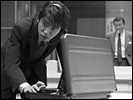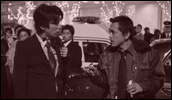Negotiator
- Year
- 2005
- Original title
- Koshonin Mashita Masayoshi
- Japanese title
- 交渉人 真下正義
- Director
- Cast
- Running time
- 127 minutes
- Published
- 28 May 2006



by Adam Campbell
I'm going to hold my hands up and say I'm an unashamed fan of Bayside Shakedown (Odoru Daisosasen), the police drama series that made a successful jump to the big screen in 1998 with a mega hit sequel in 2003, Bayside Shakedown 2: Save the Rainbow Bridge!, the most successful non-English film of the year. With his first film since that success, director Katsuyuki Motohiro returns with a spin-off focusing on fan favourite Masayoshi Mashita, the first fully trained negotiator on the Tokyo Metropolitan police force. Downplayed by comedian Yusuke Santamaria (recently seen in Kiyoshi Kurosawa's Doppelgänger), Mashita's character was always a welcome addition to the previous Odoru dramas, making him prime material for a spin-off. Sticking to formula, Mashita's story is a human police drama, dealing more with clashes of personalities than gunfights.
Carrying directly on from the previous film, an unseen terrorist takes umbrage at a press conference where Mashita, following the conclusion of the Rainbow Bridge case, confirms himself as the only hostage negotiator in Japan. Fast forward to Christmas Eve 2004, the same obsessive has taken over a state-of-the-art train and is using it to terrorise the Tokyo transit system. His conditions? Of course he refuses to deal with anyone but Masayoshi Mashita, the only negotiator in Japan. Mashita, for his part, has a Christmas Eve date with his girlfriend and an office full of belligerent railway staff to deal with, besides the threat to commuters.
The previous Odoru films where just as concerned with how red tape and police procedure can get in the way of an investigation as with the investigation itself. This film makes very clear in the opening moments that Mashita has the full authority of the police force behind him, albeit on the head of his superior Muroi. Instead, the conflict arises from the fish-out-of-water scenario as Mashita is forced to deal with another faceless bureaucracy, the Tokyo transit system, who mysteriously do not welcome his input on what is clearly a criminal matter.
This is thoroughly light entertainment. The conflicts are light, the threat is light, the humour is perhaps a little too light. For most of the film, the worst fate Tokyo commuters can face is a solid bashing from the hijacked super train, looking like an armoured Shinkansen as it barrels through the subway system in search of new targets. As with most office politics, the biggest problems come from hesitation and ruffled feathers than any true danger to Christmas Eve customers.
A notable difference between this picture and the other Odoru films is the resistance of the film to make sense or add up. Jun Kunimura, as a dour railroad chief, risks the lives of his passengers to protect a secret so mundane as to beggar belief. Mashita promises to take this information to his grave mere seconds before informing the entire police force and transport authority. Loved ones are improbably put in danger and seemingly forgotten about and perhaps worst of all, the terrorists clues are ridiculously obtuse, and solved mostly by inspired hunches and the power of Google, as wielded by Kotaro Koizumi, the Prime Minister's son, reprising his role as an IT officer.
One telling element deals with Japan's attitude toward Christmas. The opening montage shows a cross section from a Tokyo Christmas. The majority of images show couples out enjoying themselves, while a careful few show parents shopping for toys with their children. Terajima, as a grouchy detective, complains about teenagers canoodling on the street, the most common meaning of a Japanese Christmas. The equally grouchy railway expert brought back to reschedule the Christmas trains complains about being dragged in on Christmas Eve, and wanting to spend the time with his grandkids. The terrorist is the first person to point out that Christmas is not actually a holiday in Japan when Mashita tries to bluff him on this point, and tellingly Mashita has no response to this. While the director makes doubly sure we know this film is set at Christmas, he doesn't seem entirely sure as to why a Japanese audience should care about this holiday, beyond the potential box office of setting yourself up as a 'Christmas film' and therefore a date movie.
Yusuke Santamaria, a breath of fresh air in the rest of the series, becomes a slight non-entity in his own film, drifting along, trying not to make waves. Motohiro aptly shows Mashita's reliance on his team, a factor missing from many Western negotiator films. It is fitting that Mashita is paired with the train company PR man, as both of them are mouthpieces for other people's hard work. Mashita merely stumbles along in awkward conversation with the terrorist via his computer system while his tech staff find information, his detectives find leads, and his tactical force, in the shape of Tokyo's SAT, find all the gun-firing, bomb-defusing action. The film certainly mentions the parallel between Mashita and the terrorist, as two-of-a-kind geeks who might have more in common.
Motohiro, however, never takes these elements to a satisfactory conclusion, settling instead for a TV drama touch that is all the more disappointing given his previous success in raising this series into definite cinematic territory. A great finishing half hour almost makes you forget how ridiculous the film has become by this point, with sharp editing and finally some sense of excitement. It seems this half hour was the minutes Motohiro would rather have shot, and the rest of the film a mere vehicle to get there. With a very weak script from Masashi Sogo, Susumu Terajima chews on scenery like he's been possessed by the spirit of Riki Takeuchi, his swaggering gangster-cop more Bad Santa than Bad Lieutenant. Jun Kunimura does a fine job of playing stoney faced and constantly annoyed, a role he certainly has cornered by now. Without satisfactory lines or direction, Yusuke Santamaria is lost at sea, smiling his way through everything and hoping for the best.
The film also falls into the trap of being overlong. It seems against some unwritten rule to release a picture these days which clocks in under two hours long, no matter how frivolous the product at hand. Despite the criticism, this is not the worst film of the year. While far from an offensive way to spend an afternoon, the first solo adventure of negotiator Masayoshi Mashita is just not what it could have been. With a great cast and a competent director, perhaps the greatest criticism against the picture is that it is just passable, failing to take full advantage of the talents involved.